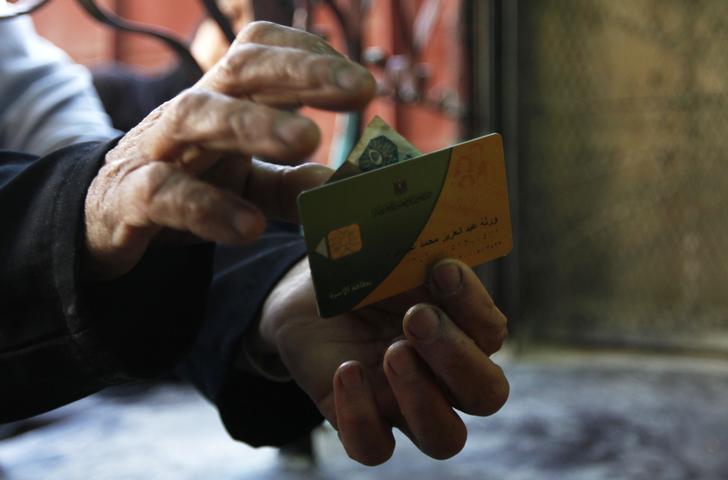Latest NEWS
- Aswat Masriya, the last word
- Roundup of Egypt's press headlines on March 15, 2017
- Roundup of Egypt's press headlines on March 14, 2017
- Former Egyptian President Hosni Mubarak to be released: lawyer
- Roundup of Egypt's press headlines on March 13, 2017
- Egypt's capital set to grow by half a million in 2017
- Egypt's wheat reserves to double with start of harvest -supply min
- Roundup of Egypt's press headlines on March 12, 2017
Smart Card company complains of delay in Egyptian subsidy cut scheme

A man holds his smart card and a note at a bakery in the Suez Canal city of Port Said, 170 km (106 miles) northeast of Cairo, February 24, 2014. REUTERS/Mohamed Abd El Ghany
By Maggie Fick
CAIRO, April 1 (Reuters) - The Egyptian government is taking too long to roll out an electronic smart card system designed to reduce costly energy subsidies, the company contracted for the project alleged on Tuesday.
Fuel subsidies account for a fifth of state spending, but one cash-strapped government after another has resisted attacking the wasteful system, fearful that raising fuel prices could spark unrest.
Motorists will eventually use cards to buy gasoline and diesel at fuel stations in a programme initiated by the administration of President Mohamed Mursi before he was ousted by the army last July.
But Khaled Abdelghany of e-Finance, the Egyptian firm in charge of implementing the initiative, said the government was delaying the reform unnecessarily by waiting until all 4.5 million registered drivers have signed up for and obtained cards.
He said authorities should set a date on which the "points of sale" already installed at fuel pumps would be activated. Then the cards "would go very quickly, they would fly," he said.
The government says the programme is designed to counter the black market and smuggling. Later on it aims to tighten up the system but has declined to give details.
Former army chief Abdel Fattah al-Sisi deposed Mursi last July after mass protests against his Muslim Brotherhood government.
Sisi, who declared his candicacy last week for presidential elections to be held at the end of May, has spoken of the cost of fuel subsidies but has given no clear prescription.
Asked why the authorities were not moving the smart card programme along more quickly, government spokesman Hani Salah said: "The decision will be taken at the right time."
Pump prices in Egypt are among the cheapest in the world. Although Gulf aid in cash and petroleum products propped up Egypt's finances in the months after the army takeover, the economy is still recovering from political turmoil since the 2011 uprising that toppled autocrat President Hosni Mubarak.
The subsidies will cost more than $18 billion this year, draining foreign currency that could be used to pay off debts to foreign energy companies and improve payment terms to encourage investment.
The government says drivers will need the cards to buy fuel but that it will not set quotas on quantities in the early phases and will be content merely to monitor deliveries.
Abdelghany said the system is ready to go and should be made mandatory.
"We have more than 12,000 points of sale distributed all over the country at the gas stations ... We have already trained 8,000 workers at the stations, all of which are connected to the network," he said.
"There needs to be a decision from the government to begin executing the project starting from date X."
The government has billed the smart card system as the first step in a reform programme that would cut fuel subsidies by 25 to 30 percent in five to six years, but officials have repeatedly missed deadlines to implement the system. (Editing by Michael Georgy/Ruth Pitchford)










